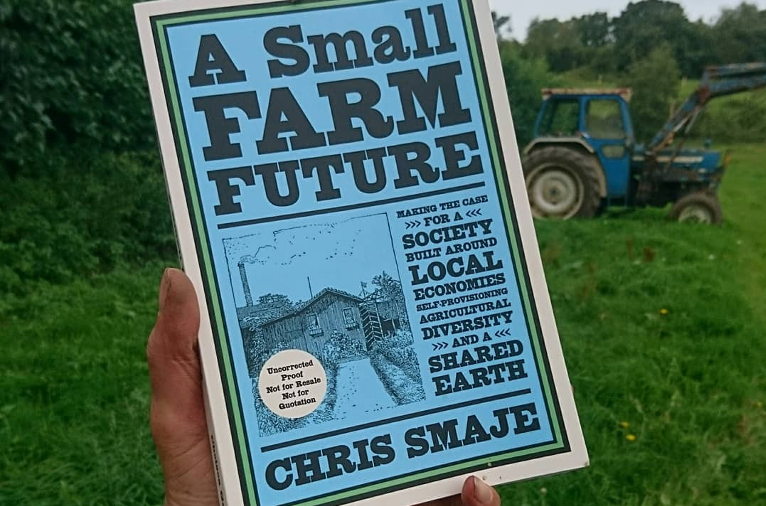It’s tempting to divert from my present cycle of posts to address the latest melodrama in the ongoing dark comedy of British parliamentary politics. However, it’s a temptation I’m going to resist. There are some things I want to say about it inasmuch as it illuminates the crooked path to a small farm future, but I think they can wait for a month or two while I work my way through my present agenda. It’s possible that by then we’ll be onto our fourth prime minister of the year. But the underlying reasons for the turbulence won’t have changed, and this is the key point to consider.
So for now I’m going to continue examining questions of health and wellbeing in a small farm future, which I introduced in my last post. There, I made some general remarks about capacities for community self-care. In my next one, I’ll broach in very summary form some more specific aspects of welfare. In fact, that’s what I’d intended to do in this post but the discussion under the last one has prompted me to divert briefly into discussing the game of Monopoly, which I hope will clarify some underlying political points and lay down a few markers for future posts.
So – you know how a game of Monopoly unfolds. Everyone starts off equal, but as the game goes on some people fall behind, possibly due to bad choices but more likely due to bad luck. Fortunes can ebb and flow, and likely winners might fall by the wayside. But eventually somebody cleans up. They own everything, while nobody else owns anything. They’re out of the game.
I concede that this isn’t exactly how the capitalist economy works in real life, but for a board game with a few simple rules, it’s an impressively accurate approximation.
It’s instructive to apply the Monopoly example to the case of welfare policy. An awful lot of political attention to welfare, especially from the political right, gets devoted to the individual player at the point they’re forced out of the game. Was it their fault? In the real world, people aren’t forced out of the game of life – not directly, anyway. But if they’re deemed undeserving because of bad choices, the welfare lifeline they’re offered is often punitive, burdened with social stigma and operates in such a way that they’re unlikely ever to be fully autonomous players in the game again. If they’re deemed merely unlucky and less blameworthy, they may get an easier ride. But the line between deserving and undeserving is often thin.
As I see it, this tendency towards individualization of loser culpability in modern welfare narratives is a bad optic for two reasons. First, it only looks at one side of the deal. Somebody loses for whatever reason, and they hand over all their assets to their creditor, a creditor who’s usually no more than a bystander in the drama of the loser’s game. Why focus so much on the undeserving poor, rather than on the undeserving rich? Accounts of the undeserving rich do exist in our politics, but they’re not nearly so prominent as their counterpart. The numerous ways that the fortunes of the world’s rich people and rich countries are extracted from the poor ones go too little remarked. Out of wealth comes the power to keep writing the rules in favour of wealth, and thence the need to keep dusting its crumbs from the table in the form of stigmatizing welfare policies.
The second problem with the individualization of loser culpability is that the loss was inevitable from the start. The exact circumstances of its occurrence may have been unique, but everyone knew at the outset of the game that all but one player would eventually lose, because the rules guarantee that outcome. You can ponder the influence of luck, choices or strategic errors all you like in the details of the individual outcome, but they don’t alter that predestined fact.
This is basically the leftwing critique of capitalism, and welfare arrangements under capitalism. The rules are rigged, so instead of wrangling over the rights and wrongs of the individuals who fell foul of them, the real need is to change the rules. A rightwing counterargument is that the rules aren’t rigged, and the game of Monopoly isn’t a good analogy for real-life capitalism where a rising tide floats all boats. I think that’s a hard argument to pull off, especially when the richest twenty or so people worldwide own equivalent assets to the poorest 4 billion or so. So many bad choices, and so few good ones? I don’t think so.
Actually, as historians of Monopoly (it’s a thing) know, the game developed from the earlier ‘Landlord’s Game’ devised by Elizabeth Magie, a proponent of Georgist land value tax, with the aim of showing the ruinous consequences of monopolism generated by economic rent and untrammeled private property rights, contrasted with the general social benefits of shared value creation.
I’m not going to get into the details of land value tax – I wrote a post expressing my misgivings about it a while back, to the ire of some Georgists who responded. All I want to do here is make a few general points about welfare in a small farm future emerging from my Monopoly example to prepare the ground for more detailed future discussions. Six general points, to be precise.
First, in the game of life I think it’s a good idea for societies to set people up to succeed as self-directing players within the broad rules of their local community. So communities need to find rules that, unlike Monopoly, keep people in circulation wherever possible as full participants in the game.
Second, people who outwardly appear to be the same, with identical initial chances of winning the game as they stand ready and waiting at ‘Go’ with an (inflation-adjusted) £1,500 in their hand, may not in fact be the same and may not in fact have the same chance of winning. This is due to numerous possible underlying differences in their capability to play the game and make their initial endowment work for them as a self-directing player. So if a community is to succeed in keeping people in play, it needs a subtle and constructive rather than a monolithic and judgmental approach to the characters on the board. This is basically Amartya Sen’s capabilities approach that I mentioned under my previous post.
Third, beyond even Sen’s capabilities approach, I would argue there is a place for an ethical framework of the kind suggested by Christianity and other religious traditions: charity, forgiveness, second chances, there but for the grace of God go I, and so on – the sort of things, in fact, that the rules of Monopoly largely forbid. I struggle to understand the mindset of professed Christians who take an instinctively punitive attitude to other people’s difficulties or welfare claims.
Fourth, however, I do have misgivings about societies with welfare institutions overly reliant upon individual charity, because this establishes patron-client relationships which too easily corrupt the wider common good. In real-life local welfare games, I would prefer most of the charity afforded struggling players to come, metaphorically, from the Bank rather than a winning player. But this in turn may set up the problem of an over-mighty Bank, which terminates in the logic of a centralized state and its associated welfare bureaucracies, with an inbuilt interest in growing its power and crushing its rivals.
Fifth, in small farm societies – in fact, in all societies – the capacity of the Bank to step in and furnish welfare is not limitless. The Bank must draw, so to speak, from the community chest, which has many calls on its limited resources. So while most or all of the preceding points probably fit within a broadly leftwing case for community provision of welfare, I also find power in the possibly more rightwing view that people need to take some personal responsibility around their welfare – providing as much of it as they can for themselves without exploitatively taking from others, and having realistic expectations about what others can provide for them when they need to call upon their help. One advantage of this is that it can safeguard against the over-mightiness of patrons or Banks in dictating what they are prepared to give and what they insist on taking. It also safeguards against the problematic consequences for people and nature of the urge to accumulate value, especially abstract capital.
Finally, building on the previous point, when it comes to the questions of distribution and redistribution broached in the Distributist movement that I’ve mentioned in previous posts, I do have some sympathy for the argument of conservative Distributists that ‘distributism doesn’t mean re-distributism’. The point of distributism isn’t to immediately recreate a cumbersome welfare bureaucracy oriented to social levelling. But, frankly, in a world where twenty-odd people own equivalent assets to four billion-odd, my sympathy with this argument is limited. Against the background of our present global capitalist society and its local manifestations, if it’s to mean anything at all distributism most definitely does have to involve re-distribution until everyone’s genuinely in the game and continues to have a fighting chance of staying in it. The trickier questions revolve around how best to make this happen.






